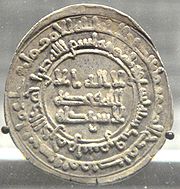
Nasr II of Samanid
Encyclopedia

914
Year 914 was a common year starting on Saturday of the Julian calendar.-Africa:* February 6 – the Fatimid general, Husaba of the Kutama Berber tribe, takes Barqah ....
–943
943
Year 943 was a common year starting on Sunday of the Julian calendar.-Africa:* Rebellion of the Zenete Berber tribe of the Banû Ifrân under Abu Yazid against the Fatimid dynasty ....
). His reign saw the high point of Samanid rule. He was the son of Ahmad ibn Isma’il.
Nasr became amir at the age of eight following his father’s assassination in January of 914. Due to his youth, his prime minister Abu ’Abd-Allah al-Jaihani undertook the regency. Almost immediately a series of revolts broke out within the state, the most serious being the one led by his great-uncle Ishaq ibn Ahmad. Ishaq’s sons took part in the rebellion; one son, Mansur, took control of Nishapur
Nishapur
Nishapur or Nishabur , is a city in the Razavi Khorasan province in northeastern Iran, situated in a fertile plain at the foot of the Binalud Mountains, near the regional capital of Mashhad...
and several other cities in Khurasan
Greater Khorasan
Greater Khorasan or Ancient Khorasan is a historical region of Greater Iran mentioned in sources from Sassanid and Islamic eras which "frequently" had a denotation wider than current three provinces of Khorasan in Iran...
. Eventually, Ishaq was captured, while Mansur died in Nishapur.
Nasr’s ascension also brought instability to the peripheries of the Samanid state. The Abbasids managed to recover Sistan
Sistan
Sīstān is a border region in eastern Iran , southwestern Afghanistan and northern tip of Southwestern Pakistan .-Etymology:...
for the last time, while Ray
Ray, Iran
Rey or Ray , also known as Rhages and formerly as Arsacia, is the capital of Rey County, Tehran Province, Iran, and is the oldest existing city in the province....
and Tabaristan were taken by the Alid
Alid
The Alid dynasties descended from Ali ibn Abi Talib, son-in-law of the Islamic prophet Muhammad. Shia Muslims consider him the First Imam appointed by Muhammad and the first rightful caliph. The Alid are followers of Ali ibn Abi Talib and his sons....
al-Utrush. Despite being unable to recover the provinces, the Samanids employed numerous local Dailamite and Gilite leaders and remained active in the struggles there. A threat of mobilization by Nasr in 933
933
Year 933 was a common year starting on Tuesday of the Julian calendar.-Africa:* Failed attempt by the Fatimid dynasty to seize the Maghreb al-Aqsa from the local rulers allied to the Spain-based Umayyad Caliphate.- Europe :* Cotentin and Jersey are seized by William Longsword, Duke of Normandy.*...
prompted the Ziyarid
Ziyarid
The Ziyarids, also spelled Zeyarids , were an Iranian dynasty that ruled in the Caspian sea provinces of Gorgan and Mazandaran from 928-1043 . The founder of the dynasty was Mardavij , who took advantage of a rebellion in the Samanid army of Iran to seize power in northern Iran...
Mardavij
Mardavij
Mardāvīj , was the founder of the Ziyarids dynasty, who successfully defeated the Abbasid's army firstly in Hamadan , and finally in Kashan and Isfahan...
, who had become the dominant power in the region, to surrender Gurgan
Gürgan
Gürgan is a village in Baku, Azerbaijan. It forms part of the municipality of Gürgən-Pirallahı....
and pay tribute for his possession of Ray. Mardavij’s brother Vushmgir
Vushmgir
Vushmgir was a ruler of the Ziyarids from 935 until his death. He was a son of Ziyar. Vushmgir means "quail catcher" in the local Caspian Iranian dialects.-Rise to power:...
, who took power in 935
935
Year 935 was a common year starting on Thursday of the Julian calendar.-Africa:* A third attempt to conquer Egypt by the Tunisia-based Shi'ite Fatimid dynasty fails....
, accepted Samanid overlordship; Samanid armies from that point on were heavily involved in protecting the Ziyarids from the Buyids, who were rising in central Persia.
Jaihani was removed in 922
922
Year 922 was a common year starting on Tuesday of the Julian calendar.- Asia :* The Khitan Empire, led by Abaoji, raids Hebei, China.- Deaths :* March 26 – Mansur Al-Hallaj, Sufi writer...
by Nasr on account of his suspected Shi’i beliefs. He was replaced by Abu’l-Fadl al-Bal’ami, who for the most part continued his predecessor’s policies. In 929
929
Year 929 was a common year starting on Thursday of the Julian calendar.- Asia :* Mpu Sindok, ruler of the Mataram Kingdom, moves his court from Central Java to East Java in Indonesia.- Europe :...
a revolt by Nasr’s brothers broke out. They proclaimed one of their own, Yahya, as amir. Bal’ami managed to quell the rebellion by turning the brothers against each other. In 938
938
Year 938 was a common year starting on Monday of the Julian calendar.- Asia :* The Liao Dynasty takes over Peking; they name Nanjing as their South Palace....
Jaihani was reinstated as prime minister, which he held until 941
941
Year 941 was a common year starting on Friday of the Julian calendar.- Births :* Charles d'Outremer, son of Louis IV of France* Brian Bórumha mac Cennétig, High-King of Ireland...
.
Nasr’s ministers helped turn the Samanid court into a cultural center. Jaihani was known as an author and wrote a geographical work. His interest in the subject caused him to invite geographers from many places to Bukhara. Scientists, astronomers, and others also flocked to the city. Bal’ami likewise was interested in the arts and patronized intellectuals and authors.
In 943 several Samanid army officers, angry at Nasr’s support of Isma’ili missionaries, formed a conspiracy to murder the amir. Nasr’s son Nuh, however, learned of the plan. He went to a banquet designed to organize the plot and decapitated their leader. To placate the other officers, he promised to stop the Isma’ili missionaries from continuing their activities. Nasr was then convinced by Nuh to abdicate; he died shortly after.

